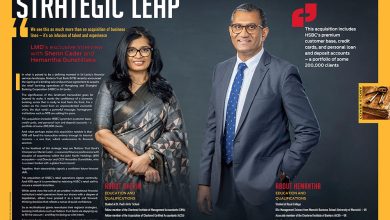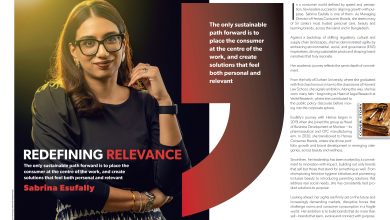COVER STORY
THE FUTURE LIES WITH THE YOUNGER GENERATION
Insaaf Mohideen outlines the role that the younger generation can play in taking Sri Lanka’s development agenda forward
 Sri Lanka born American entrepreneur and investor Insaaf Mohideen lays claim to a career that spans more than two decades, in the twin fields of technology and entrepreneurship, with a foothold in Silicon Valley.
Sri Lanka born American entrepreneur and investor Insaaf Mohideen lays claim to a career that spans more than two decades, in the twin fields of technology and entrepreneurship, with a foothold in Silicon Valley.
Counting on his extensive experience in investment banking, and having invested and advised more than 100 Silicon Valley startups, Mohideen acts in the capacity of Chief Investment Officer (CIO) to one of the largest sovereign wealth funds in the world – and he keenly eyes the potential of emerging markets such as Sri Lanka.
In this exclusive interview with LMD, Mohideen discusses the state of the nation especially in the aftermath of the Easter Sunday attacks, which saw him return to the island to help fellow citizens get back on their feet.
He also addresses the key facets of Sri Lanka’s ICT industry, entrepreneurship prospects and startup culture.
Having met and consulted with members of the younger generation during regular visits to Sri Lanka, Mohideen emphasises the role that youth can play in taking their ideas and the nation’s development agenda forward – and to this end, he unequivocally states: “In youth lies our future and tremendous hope; and in them should be our investment.”
– LMD
You have reportedly invested in and advised more than 100 Silicon Valley startups in the spheres of fintech, big data, cloud computing and social media. What lessons have you learnt from this and your presence in Northern California for some 25 years?
Youth! Youth! Youth! The true prospects of a country or state can be gauged by the pulse of the youth – by their education, engagement, activism, unity, social goodness, entrepreneurism and patriotism.
I’ve learned and in turn dedicated a majority of my professional life to working with youth across startups, mentoring, charitable efforts and activism, or simply helping their voices to be heard across the US, Scandinavia, Latin America, Africa and the Middle East.
In youth lies our future and tremendous hope; and in them should be our investment. So enable and guide youth, and watch miracles happen. Silicon Valley has transformed the way we work, live, play and transact in such a short span of time – this is a true testament to the power of youth.
An economy or country devoid of youth participation is surely gearing up for failure. Quite often, if they feel neglected, young people withdraw into apathy. But if they’re heard, youth are a powerful force.
 How do you view investment opportunities and growth potential in a market such as Sri Lanka?
How do you view investment opportunities and growth potential in a market such as Sri Lanka?
Armed with the proper leadership and policies, Sri Lanka has the potential to follow in the footsteps of Singapore and Hong Kong in a similar fashion to the Rajiv Gandhi-esque transformation of India from a manufacturing to a service economy. There’s massive potential for Sri Lanka to transform into a new age service economy.
In developing countries, the services sector is mostly focussed on hospitality, retail, healthcare, human services, IT, education and financial services to a lesser extent. And the majority of the economy relies on manufacturing due to lower labour costs.
I’m talking of the transformative economy centred on the ‘servitisation’ of products or the product service system. The real transformation and opportunity is going to come from truly making that shift to a product based service economy encompassing ICT, fintech, big data analytics, alternate currency, machine learning, prognostics, cyber-physical systems, threat monitoring, detection and so on.
This is a global shift – the percentage of Fortune 500 companies that are classified as being in the services sector is for the first time higher than manufacturing at the beginning of this decade. The American Rustbelt is a classic example of how an entire micro-economy was left behind because it failed to make the shift to servitisation while the rest of the American macro-economy thrived.
 And your assessment of Sri Lanka’s country image is…?
And your assessment of Sri Lanka’s country image is…?
There’s no simple answer to this. In the US, a majority of the people haven’t even heard of Sri Lanka. While they’ve heard of Bali and Mykonos, they don’t even know that Sri Lanka exists.
On the other hand, TripAdvisor named Sri Lanka as the top destination and our cuisine as a ‘must try.’ Among investors, we’re known for fairly robust and stable economic activity in the region even after 4/21.
All in all, postwar Sri Lanka has enjoyed a steadily improving image on the global platform. And it is my hope that the Easter Sunday incident is a mere speed bump on the path to global domination!
You have said that foreign investors will take a call on their investments in Sri Lanka in the near future. Can you elaborate on this and perhaps pinpoint the must-haves for there to be a positive reaction to investment in the 4/21 aftermath?
This was a comment I made in the immediate aftermath of the Easter Sunday attacks. While investor confidence and sentiment was rattled following 4/21, it did not result in a mass exodus.
In fact, I’m pleased that the currency and market have held up amazingly well given the magnitude of the attacks and ensuing sentiment of a possible ethnic meltdown.
At a political level, the fingerpointing and mud-slinging certainly don’t help. Any major new investment – or increase in investment – will most likely occur after the presidential election. In South Asia, unlike in the West, a massive emphasis is placed on an election – not only in terms of who comes into power but quite often, there are uncertainties and risks, and election related carnage.
As investors, we would obviously want to see economic and financial policies and safeguards that are capitalistic, free market leaning and foreign investor friendly, such as monetary policy to counter the fears of inflation, transparency at the Central Bank level, plans to manage debt or deficits, investor safeguards despite bipartisan politics, and a free unhindered flow of capital and repatriation.
Do you believe that events such as the Easter Sunday attacks would deter investment over the medium term?
It certainly provides any investor cause for pause.
One of the redeeming qualities of Sri Lanka since the end of the war, namely as a peaceful safe haven, has been tested. Seasoned investors in Sri Lanka are less likely to stay away in the medium term because they understand and realise the nation’s potential. They will likely resume investments in full force after a short-term wait and see pattern assuming peace, safety and stability. Investors who are new to Sri Lanka will certainly want to do more due diligence and likely weigh their options.
Events such as 4/21 certainly don’t improve investor sentiment and confidence.
In your opinion, what further steps should Sri Lanka take to revive itself in the aftermath of 4/21?
Unity, clarity and transparency when it comes to how such a colossal intelligence failure occurred – more so, to prevent future attacks rather than playing the blame game. Divisive blame games on all political fronts send an alarming message to international travellers and the investor community.
Sri Lanka needs to stand united at a political, social and ethnic level. This needs to be loud and clear.
Ultimately, the country has to exude a level of confidence in its security measures, which can only come from clear and transparent communication. But in my opinion, it’s been less than forthcoming.
With regard to the regulatory environment, what incentives and reforms would help attract more investment into the country?
A regulatory framework for foreign direct investment (FDI) and other investments must include but not be limited to credible economic and financial indicators from the Central Bank and other governing bodies.
Sri Lanka’s official inflation statistics for instance, are clearly underreported if you evaluate the constituent inflation of the Colombo Consumer Price Index (CCPI).
Inflation, interest rates and debt need to be managed; intellectual capital and property must be respected and protected; entry, operating and locating procedures should be clearly defined; and free trade zones need to be established for ICT, finance etc.
Alleviate fears of nationalisation; introduce favourable tax treaties and treatment; and set up a non-bureaucratic institution that can help investors and entrepreneurs navigate the bureaucracy and paperwork.
In what ways can Sri Lanka foster entrepreneurship among the citizenry?
Entrepreneurial cultures have to be cultivated from the ground up. Society must begin to view entrepreneurs and startups with as much excitement as blue-chip corporates.
Funding models, incubators and other investment vehicles need to exist in the form of venture funding versus traditional valuation and loan models. This will not happen until the local market appreciates that the risk-reward model is very different from traditional businesses. Until such time, people like myself have to facilitate this from the likes of Silicon Valley and sovereign funds.
Enterprises and state institutions can successfully catalyse such a shift, by investing and encouraging incubators, hackathons and scholarships – as I’ve helped facilitate in the Scandinavian region, Jordan, Dubai and Qatar. We’ve taken the likes of 500 startups to those regions.
Ultimately, when startups have successful monetisation events such as IPOs and high multiple acquisitions, the culture will surface overnight. There is no shortcut to proven success in a model!
As for the ICT industry in particular, how would you rate the skills of local talent in comparison with peer nations?
Much like in other industries, learning the basics of ICT is simple. They can be acquired through local, online or foreign institutions.
However, once those basics are learned, Sri Lanka currently does not offer much opportunity to diversify, and acquire experiential skills and depth. It’s one thing to learn the basics of coding but a very different beast to apply those skills to machine learning or big data analytics.
This depth of skills can only come from Sri Lanka attracting incumbents (e.g. Google and Facebook) to set up shop in the island through incentivisation. Countries such as Ireland and Poland have done this successfully.
And what needs to be done to better engage the youth in Sri Lanka’s development process?
After the 4/21 events, I spent quality time talking to youth from all walks of life spanning the socioeconomic, ethnic and geographic spectrum, to understand their concerns ranging from apathy and discontentment, to outright violent emotions towards leaders or a particular group of people.
They are disillusioned with the leaders and the system – the incumbents as well as the opposition. To sum it up, they aren’t heard, impacted or represented.
Our predominantly ageing parliamentarians have proven incapable of the change needed to engage our future – i.e. the youth. Look at how often youth affairs or new economy issues are addressed or comprehended by Sri Lanka’s bipartisan politics that’s stuck in the antiquities of corruption, scandals and fingerpointing. Millennials and gen Z aren’t interested in that.
If you provide our youth a forum to be meaningfully heard and impacted, they would eagerly participate in the development process. It’s our collective responsibility to make this happen – leaders across the social, political, economic and media sectors must come together to engage them.
They want to be heard, have a say in global change and succeed. However, this generation also expects to be invited and engaged unlike previous generations that fought for our representation.
Therefore, they’ve withdrawn into apathy. So to an extent, the youth also have to step up their involvement through ideas, demands and activism for the collective good.

How important are language skills – particularly English – in the context of upping the ante in the ICT industry?
English is paramount. ICT by nature is global. Today, we have the ability to launch a billion dollar business from Sri Lanka that solves a global problem by virtue of a servitisation economy.
To serve the globe, you need to be global. English is global. However, to be truly global, you have to master certain key languages: Mandarin, Arabic, English and Spanish at the very least.
In terms of industry dynamics, could you outline the most pertinent ICT trends from which Sri Lanka can benefit in the future?
Alternate currencies are here to stay. The digital global economy requires a globally portable digital currency. As regulations and banking around this medium evolve, Sri Lanka has deep banking and tech skills to be able to claim a stake in this new age banking system.
As for machine learning and big data analytics, we have the technical depth to be able to develop an industry around this ever evolving intelligent play.
In fintech, Sri Lanka has long been known for back office work in the financial services industry. Given its privacy laws, and adherence to global know your customer (KYC) and anti-money laundering (AML) efforts, Sri Lanka is well positioned to capitalise on this trend.

How do global entities perceive doing business in the South Asian region – with a particular emphasis on Sri Lanka?
Corruption, bribery and red tape are major issues. When you’re a global entity that adheres to strict CSR and ethical standards, it is very hard to operate in an environment that thrives on under-the-table negotiations. If you are a large economy such as India or China, there’s an incentive. However, in a smaller economy such as Sri Lanka, the incentive isn’t there.
Regardless of who’s in power, Sri Lanka has a track record for these negative traits.
With the tourism industry being integral to the national economy and Sri Lanka’s growth prospects, how can it be leveraged on?
Further investments that enable and enhance the industry need to occur around transportation and infrastructure, providing easy access to and from the international airport, the north and east, and deep south.
While Sri Lanka has world-class resorts, it lacks ‘experiences’ or resorts with amenities that offer unique experiences such as living on a tea estate, a farm or typical Sri Lankan village. Activities, water sports and extreme sports is another area on which to focus.
The nation must develop a robust local carrier. SriLankan Airlines is in a sorry state. Advertising the country through a world-class carrier works! Emirates put Dubai on the map. Now Turkish Airlines is putting Istanbul on the map.
Going forward, in which areas are you looking to engage with Sri Lankan enterprises – and why?
I’m not here as an investor but as a patriot who was rattled by recent events and the increasing disengagement of our youth. I am looking to engage with Sri Lanka on all things youth related, spanning the enterprise, economic, political, social and educational spectrum.
Regardless of who runs this country, I want to help mobilise our youth as active or dynamic participants of the global economy and politics. As such, I’m launching an initiative titled ‘#WeRepublic’ encouraging our youth to be engaged, care about Sri Lanka, bring change to the country and hold its leaders accountable.
Beyond this, I will focus on fostering startups through ideation, hackathons, incubation, mentoring, workshops and venture or angel investments. We will also work with the next generation of leaders, philanthropists, politicians and policy makers, to offer them the required education, internships and exposure to rise to the occasion.
Ultimately, I want to empower our youth to take charge by fostering an environment that is conducive to the free flow of ideas, unity, entrepreneurism and change.











I agree that with proper leadership and policies Sri Lanka can follow Singapore and Hong Kong. But not sure about the Rajiv Gandhi kind of transformation in India – as he says, from a manufacturing to a service economy – because the dynamics are very different there. The main problem we’re facing is political and policy instability, and we will never improve until these two issues are resolved.